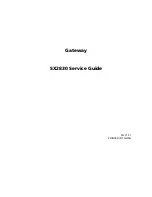
Safety Instructions
● When working with the CAN-EtherCAT follow the instructions below and read the manual
carefully to protect yourself from injury and the CAN-EtherCAT from damage.
● Do not use damaged or defective cables to connect the CAN-EtherCAT and follow the CAN
wiring hints in chapter: "Correct Wiring of Electrically Isolated CAN Networks".
● In case of damages to the device, which might affect safety, appropriate and immediate
measures must be taken, that exclude an endangerment of persons and domestic animals and
property.
● Current circuits which are connected to the device have to be sufficiently protected against
hazardous voltage (SELV according to EN 60950-1).
● The CAN-EtherCAT may only be driven by power supply current circuits, that are contact
protected.
A power supply, that provides a safety extra-low voltage (SELV) according to EN 60950-1,
complies with this conditions.
● Do not open the housing of the CAN-EtherCAT.
● The CAN-EtherCAT has to be securely installed before commissioning.
● Never let liquids get inside the CAN-EtherCAT. Otherwise, electric shocks or short circuits may
result.
● Protect the CAN-EtherCAT from dust, moisture and steam.
● Protect the CAN-EtherCAT from shocks and vibrations.
● The CAN-EtherCAT may become warm during normal use. Always allow adequate ventilation
around the CAN-EtherCAT and use care when handling.
● Do not operate the CAN-EtherCAT adjacent to heat sources and do not expose it to
unnecessary thermal radiation. Ensure an ambient temperature as specified in the technical
data.
DANGER
Hazardous Voltage -
Risk of electric shock
due to unintentional contact with
uninsulated live parts with high voltages inside of the system into which the CAN-
EtherCAT is to be integrated.
→ All current circuits which are connected to the device have to be sufficiently protected
against hazardous voltage (SELV according to EN 60950-1) before you start with the
installation.
Qualified Personal
This documentation is directed exclusively towards personal qualified in control and automation
engineering.
The installation and commissioning of the product may only be carried out by qualified personal,
which is authorized to put devices, systems and electric circuits into operation according to the
applicable national standards of safety engineering.
Conformity
The CAN-EtherCAT is an industrial product and meets the demands of the EU regulations and
EMC standards printed in the conformity declaration at the end of this manual.
Warning:
In a residential, commercial or light industrial environment the CAN-EtherCAT may
cause radio interference in which case the user may be required to take adequate
measures.
CAN-EtherCAT
Manual • Doc. No.: C.2922.21 / Rev. 1.4
Page 5 of 92






































